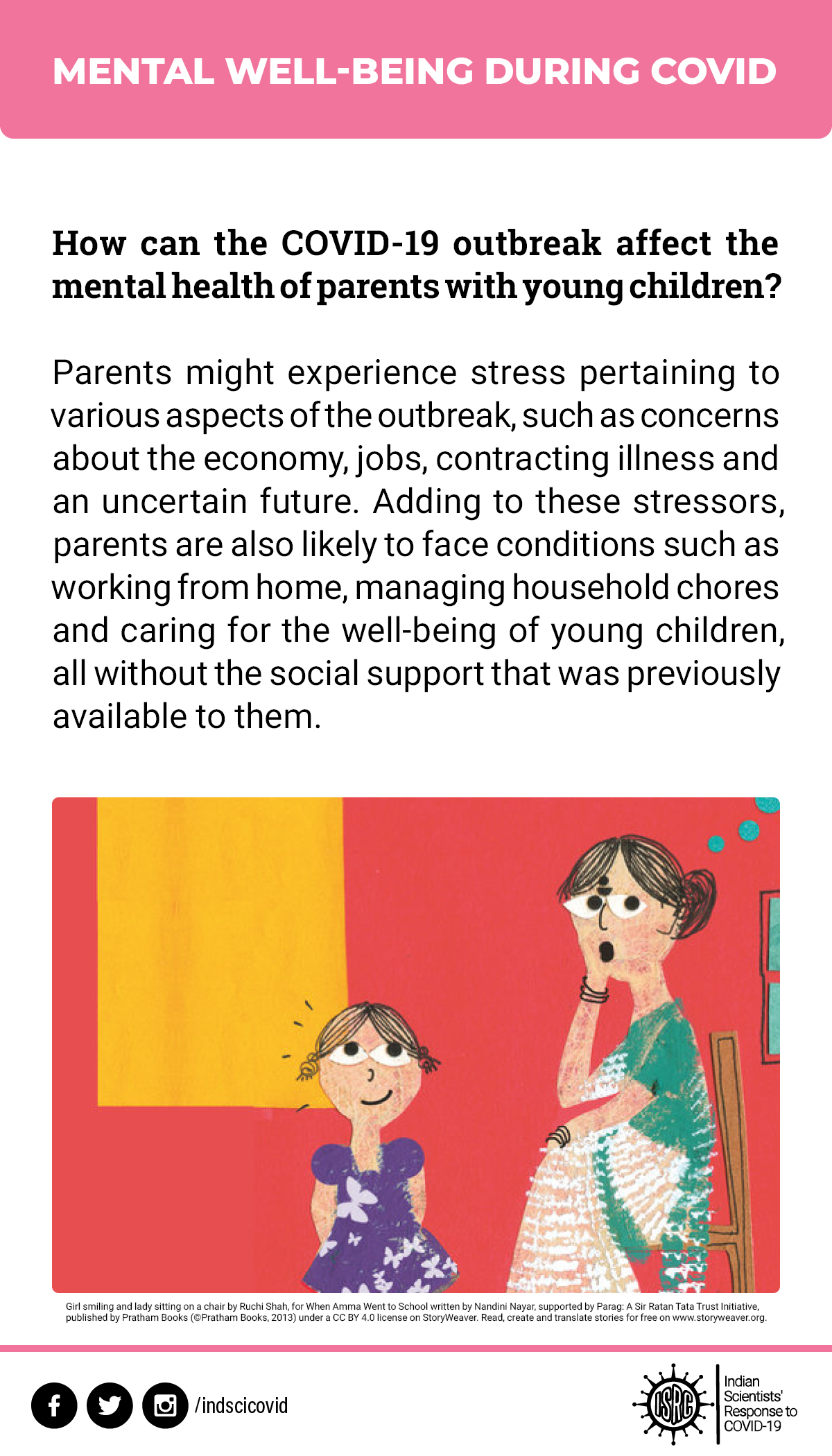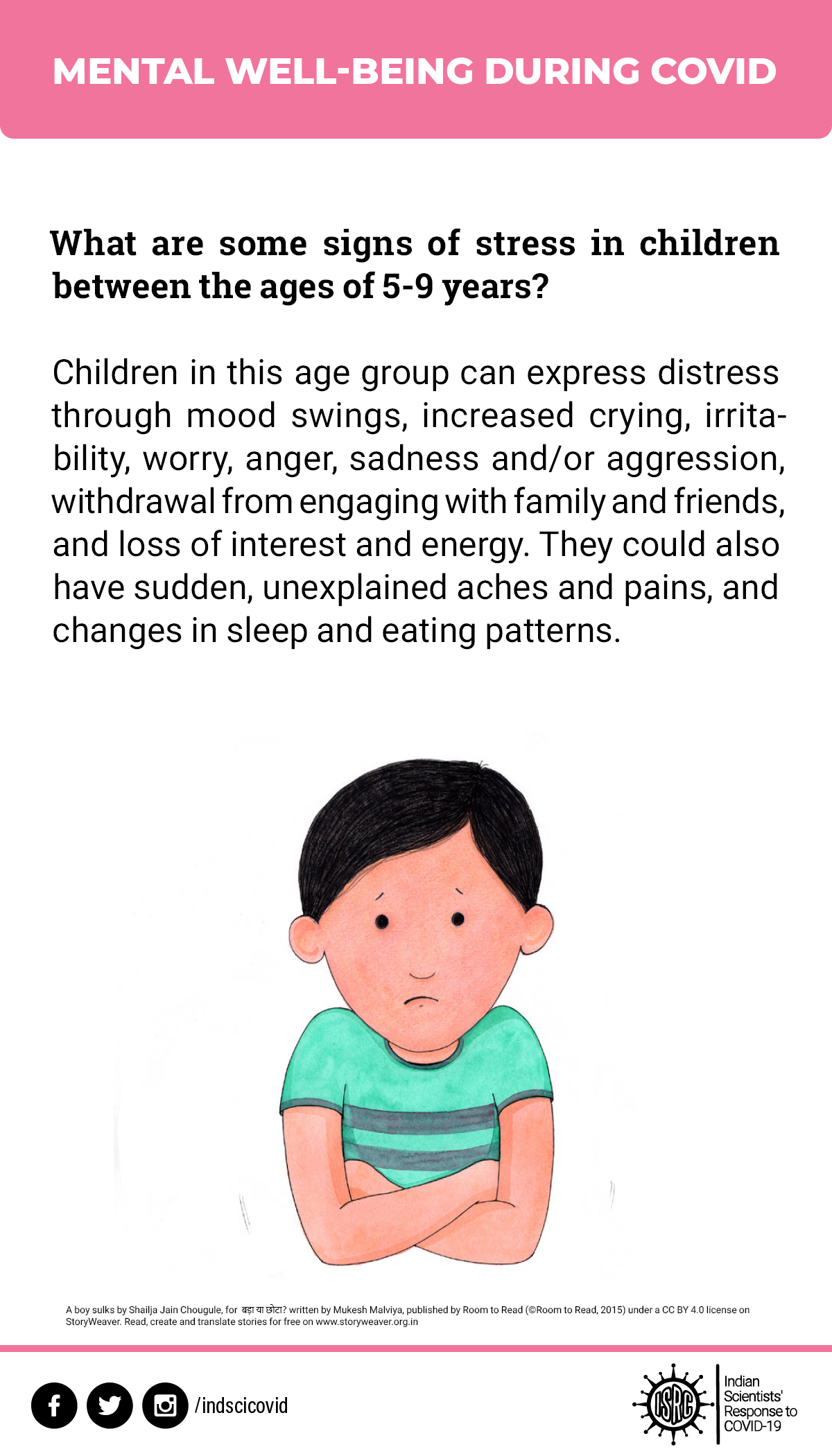Mental Health of Children
As a result of the outbreak, parents and children are facing circumstances they have not dealt with before. Young children are seeing a shift in their typical routines and likely becoming aware of the stress experienced by the adults around them. We offer here some information to help parents and family members understand how the emotional health of children can be impacted, what might be some warning signs to look for, and how one can talk to and offer support to children at this time.
We provide infographics in several languages as well as more details. Click on images to open and download them!
How can the COVID-19 outbreak affect the mental health of young children?
Children respond to stressors in different ways depending upon their age, previous experiences, and typically employed coping mechanisms to manage stress. In the present situation, the emotional health of children might be impacted by
- Their awareness of stress experienced by those close to them
- Disruption of their regular structure and routine (school, playdates, physical connections, etc.)
The way information is presented to children can play a significant role in impacting their mental health. Giving incomplete or age-inappropriate information can contribute to greater levels of stress in children.
Younger children especially thrive on routine and can experience distress with a lack of structure, and older children might especially be attuned to the ways in which physical distancing is changing their typical social connections with others outside of their homes. Special attention needs to be directed towards children with special needs, past mental health concerns, and those living in abusive environments. This population is more vulnerable to developing mental health concerns without support and resources.
More information on this can be found here – https://www.cdc.gov/childrenindisasters/helping-children-cope.html
How can the COVID-19 outbreak affect the mental health of parents with young children?
Parents might already be experiencing stress pertaining to various aspects of the outbreak, such as concerns about the economy, jobs, contracting illness, and an uncertain future. Adding to these stressors, during the lockdown, parents are likely to face the responsibility of helping members of their family (especially children) to maintain a regular routine and stay connected with friends and family. In many ways, parents might be expected to continue with their typical responsibilities at work and at home, without being able to access the support that was available to them before the outbreak. These circumstances might contribute to greater levels of stress within the family.
Additional information can be found here:
- https://www.cdc.gov/coronavirus/2019-ncov/daily-life-coping/talking-with-children.html?CDC_AA_refVal=https%3A%2F%2Fwww.cdc.gov%2Fcoronavirus%2F2019-ncov%2Fcommunity%2Fschools-childcare%2Ftalking-with-children.html
- https://www.who.int/docs/default-source/coronaviruse/helping-children-cope-with-stress-print.pdf
- https://www.poynter.org/reporting-editing/2020/how-to-talk-with-kids-about-the-coronavirus
- https://www.shedoesthecity.com/6-ways-to-keep-your-anxious-kid-calm-during-covid-19?fbclid=IwAR3wH27XoJG0dGUg9KJwh0vPNXauMSR-DcElcTrDKmtSVuaOhZyRsbCJwIY
- https://www.nationalgeographic.com/family/in-the-news/coronavirus/kids-mental-health-coronavirus/
What are some signs of stress in children between the ages of 2-4 years?
Here are some signs of distress in children between the ages of 2-4 years
- Increased clinginess
- Regression of behaviors (e.g. bathroom accidents, thumb sucking)
- Increased crying and tantrums. Please note that crying and tantrums can be part of typical development in children. Some factors to consider here are – if there have been any recent changes in the frequency of crying, and if the child is not responding to strategies employed by parents to provide comfort over a period of time (at least a few weeks).
- Worry about separation from parents
- Disturbances in sleeping and eating patterns
Additional information can be found here – https://www.cdc.gov/coronavirus/2019-ncov/daily-life-coping/managing-stress-anxiety.html?CDC_AA_refVal=https%3A%2F%2Fwww.cdc.gov%2Fcoronavirus%2F2019-ncov%2Fprepare%2Fmanaging-stress-anxiety.html
What are some signs of stress in children between the ages of 5-9 years?
Here are some signs of distress in children between the ages of 5-9 years:
- Mood Swings
- Increased irritability
- Increased worry, anger, sadness or aggression
- Sudden unexplained aches and pains
- Changes in sleep and/or eating patterns
- Withdrawing from family and/or friends
- Loss of interest and energy
Additional information can be found here – https://www.psychologytoday.com/us/blog/warning-signs-parents/202003/6-ways-help-your-kids-cope-the-coronavirus-crisis
When do I reach out for professional help to support my child?
Keep in mind that parents know their child best and each child responds differently to stress. Parents who have tried strategies to ease and soothe their child over a period of time without success might feel stuck and overwhelmed. Professional help should be sought out if parents have tried different strategies and no reduction is seen in the frequency (number of times behavior is observed) and intensity (power of the behavior) of said behavior over a substantial period of time (2-4 weeks). Another indicator of needing professional support could be when the child’s behavior disrupts the typical life within the family unit.
Additional information can be found here –
- https://hospitals.kvc.org/2020/04/10/childrens-mental-health-warning-signs-to-watch-during-the-coronavirus-outbreak/
- https://www.cdc.gov/coronavirus/2019-ncov/daily-life-coping/managing-stress-anxiety.html
How can I help my child cope with the present situation?
- Children need structure, so try and work on a schedule for the day that would create a flexible routine for the family and the child. Important to keep in mind that this routine needs to work best for your family.
- Think of innovative activies and physical exercise that the child can engage in at home.
- Offer support, reassurance and care by listening to and recognizing the emotions expressed by young children
- Talk about the outbreak keeping in mind your child’s developmental level and by following their cues. Encourage your child to ask questions and answer in ways that balance honesty (e.g. we need to stay indoors to make sure we are safe) with comfort (e.g. we are doing what we can to stay safe such as washing our hands; the virus is rare among children).
- It is natural for parents to have fears and concerns at this time and thus self-care for parents is also an important consideration. Children tend to pick up on their parents’ feelings and thus engaging in self-care and managing one’s own mental health concerns will help parents provide a calm and reassuring space for their children.
- Additional information can be found here – https://www.cdc.gov/coronavirus/2019-ncov/daily-life-coping/talking-with-children.html?CDC_AA_refVal=https%3A%2F%2Fwww.cdc.gov%2Fcoronavirus%2F2019-ncov%2Fcommunity%2Fschools-childcare%2Ftalking-with-children.html
How can I talk to my child about the CoVid outbreak?
- Offer reassurance and comfort while talking about the outbreak.
- Listen to information that the child already knows and add to it as needed.
- Make sure to check in about possible concerns and worry experienced by the child, and offer a space to talk.
- It can help to focus the conversation towards solution finding and building safety. This helps the child feel empowered.
- Share facts while tending to things that are within control (e.g. washing hands to stay safe, physical distancing will keep us safe)
- Be attuned to your own mental health concerns and stress levels as parents, and recognise when you might need some time for self-care in order to engage in these conversations.
Additional information can be found here – https://www.nctsn.org/resources/parent-caregiver-guide-to-helping-families-cope-with-the-coronavirus-disease-2019
Additional Resources:
- https://www.nctsn.org/sites/default/files/resources/fact-sheet/simple_activities_for_children_and_adolescents_4.pdf
- https://www.who.int/news-room/detail/09-04-2020-children-s-story-book-released-to-help-children-and-young-people-cope-with-covid-19
- https://www.weareteachers.com/things-to-do-during-covid/?utm_content=1584460940&utm_medium=social&utm_source=facebook
- https://www.unicef.org/coronavirus/how-protect-your-familys-mental-health-face-coronavirus-disease-covid-19
Some Helpline Numbers







